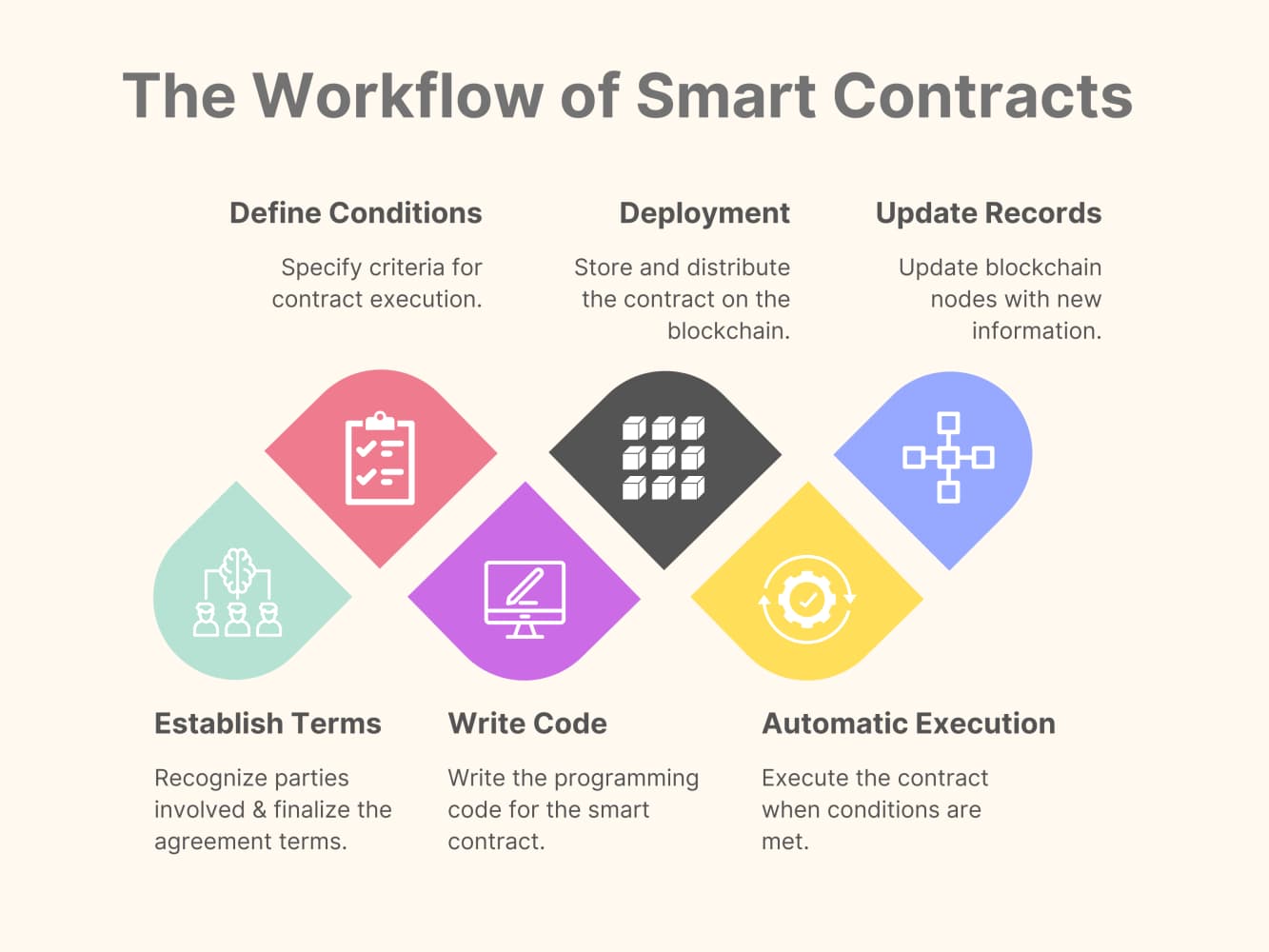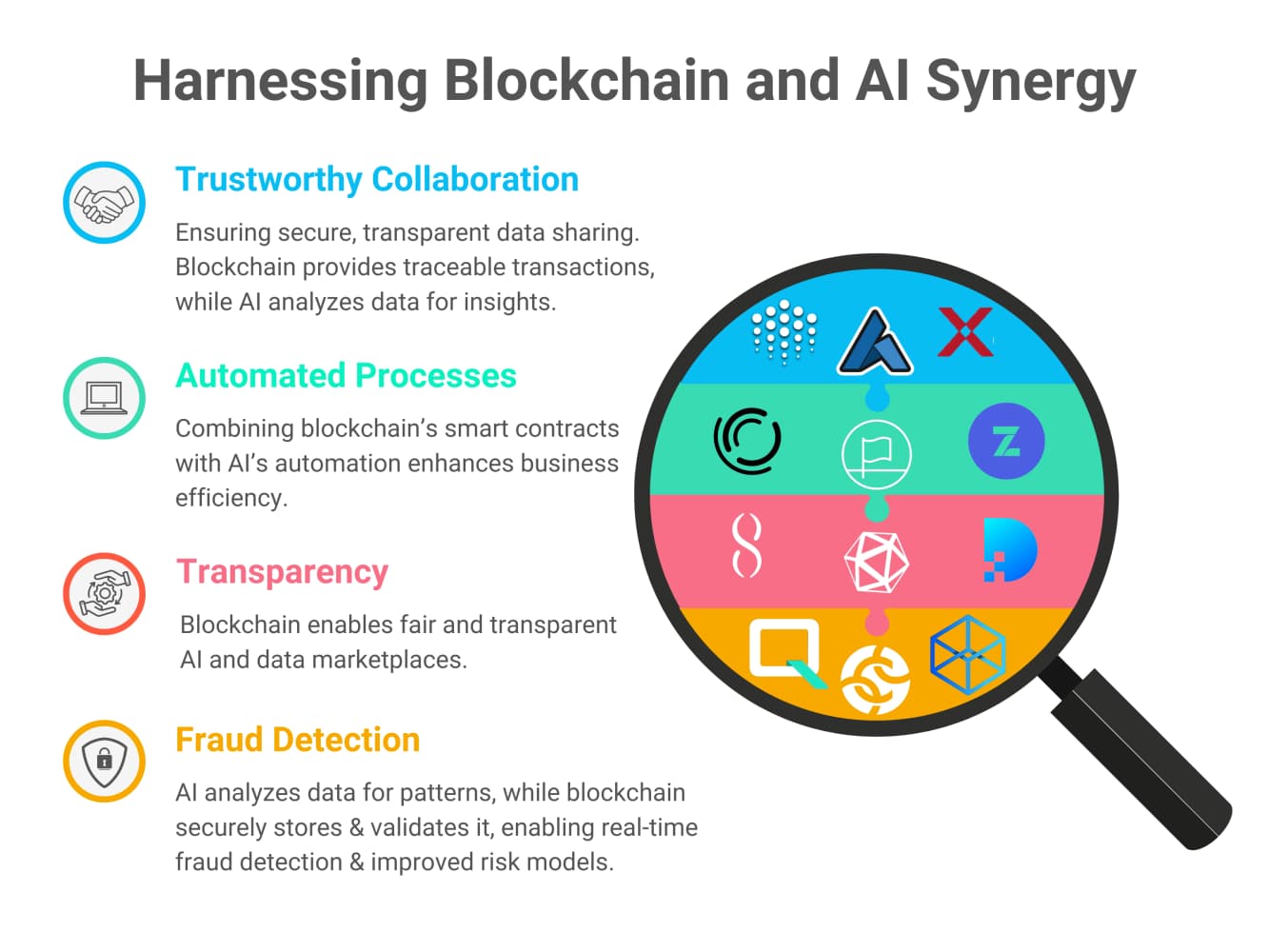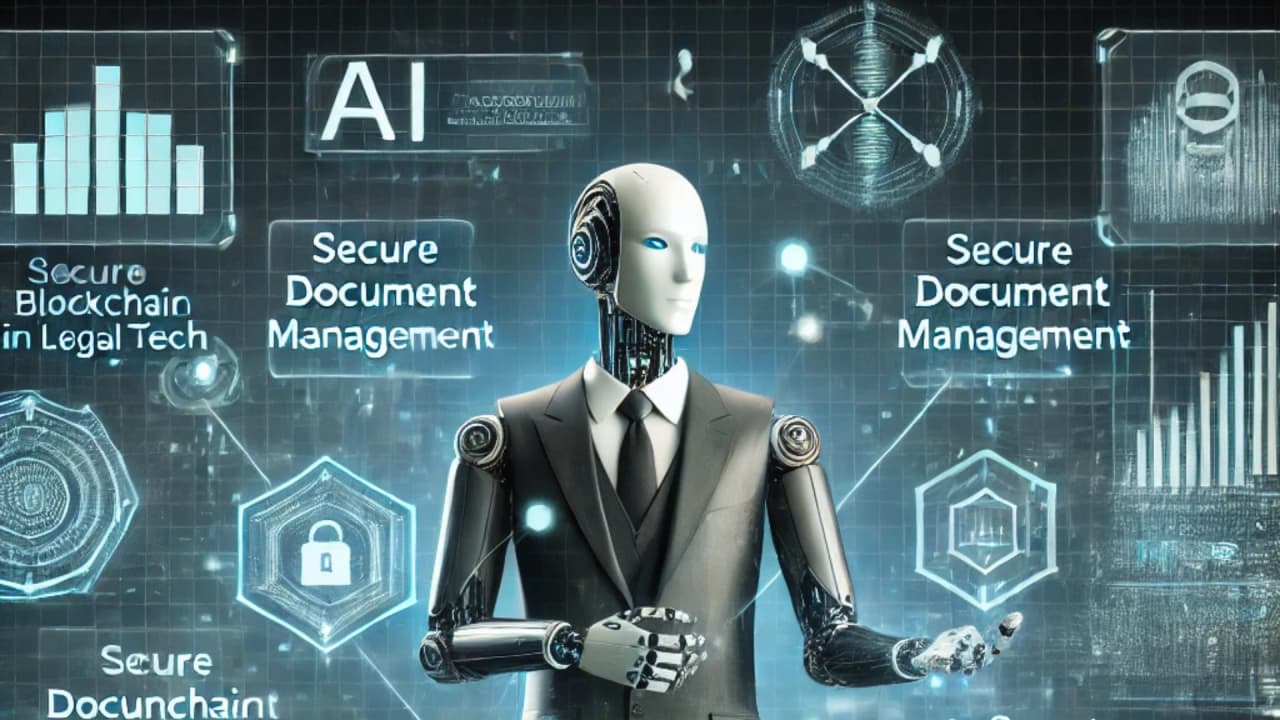The legal industry is undergoing a major change thanks to Artificial intelligence (AI) and Blockchain technologies. These two innovations are completely transforming the way legal services are provided, making operations more efficient and improving client interactions.
Impact of AI on Legal Services
Automation of Routine Tasks:
AI tools can automate tasks such as document preparation, billable hours tracking, and even initial client consultations.
This frees up valuable time for legal professionals, allowing them to focus on more complex cases.
Enhanced Legal Research:
Advanced algorithms can analyze vast amounts of legal data quickly, providing relevant case law and statutes.
This not only increases accuracy but also significantly reduces research time.
Predictive Analytics:
AI can analyze historical case outcomes to predict the likelihood of success in current cases.
This empowers lawyers to develop better strategies and provide informed advice to clients.
AI: This includes machine learning, natural language processing, and predictive analytics. These tools help automate repetitive tasks, increase accuracy in legal research, and speed up document review. For more information visit: 10 U.S. Code § 2358.
Blockchain’s Role in Legal Transactions
Secure Record-Keeping:
Blockchain offers an immutable ledger for recording transactions, ensuring that all entries are tamper-proof.
This security feature is crucial in maintaining the integrity of sensitive legal documents.
Smart Contracts:
These self-executing contracts with terms directly written into code enhance efficiency by automating agreement execution.
They reduce the risk of disputes and streamline processes, benefiting clients and attorneys alike.
Transparency in Transactions:
The decentralized nature of blockchain ensures that all parties have access to the same information, fostering trust.
Clients can track the status of their cases or transactions in real-time, enhancing communication.
Blockchain: This technology offers a secure and unchangeable record-keeping system. It guarantees that legal transactions are transparent and trustworthy.
The Synergy Between AI and Blockchain
The combination of AI and Blockchain has the potential to revolutionize the legal field by:
- Boosting Security: Enhanced protection against fraud through secure transaction records.
- Improving Efficiency: Streamlined workflows from automated processes combined with secure agreements.
- Empowering Clients: Providing clients with tools to understand their cases better through accessible data and predictive insights.
By integrating these technologies, law firms can not only improve their operational efficiencies but also elevate client experiences significantly.
The Role of Blockchain in Legal Tech
Blockchain technology plays a vital role in the legal industry by providing a secure and transparent method for managing legal documents. Its core feature, the immutable ledger, ensures that once information is recorded, it cannot be altered or deleted. This characteristic is crucial for maintaining the integrity of legal documents, as it fosters trust and reliability in transactions.
Key aspects of blockchain technology include:
- Decentralization: Unlike traditional databases, blockchain operates on a distributed network of nodes. This reduces the risk of data manipulation or failure from a single point.
- Transparency: Every transaction on the blockchain is visible to all participants, creating an open environment where information can be audited easily.
- Security: Advanced cryptographic techniques protect data from unauthorized access, making it extremely difficult for malicious actors to compromise sensitive legal information.
The implications of an immutable ledger extend beyond mere document security. It ensures that evidence preservation and transaction records are verifiable, thereby enhancing accountability among parties involved. As legal practices adopt blockchain technology, the potential for increased trust and efficiency in legal transactions becomes evident.
Smart Contracts: Automating Legal Processes with Blockchain
Smart contracts are self-executing agreements embedded within a blockchain, where the terms of the contract are directly written into code. This technology operates on an “if-then” principle, meaning that when predetermined conditions are met, the contract executes automatically without the need for human intervention.
Key Features of Smart Contracts:
- Automation: Reduces the necessity for intermediaries such as lawyers or notaries, streamlining processes and minimizing costs.
- Speed: Expedites contract execution significantly. Traditional processes involving multiple parties can take weeks or months; smart contracts can execute in real-time.
- Accuracy: Errors caused by manual input or miscommunication are virtually eliminated since the terms are coded and executed automatically.

The benefits of smart contracts extend beyond efficiency. They enhance security through cryptographic protection, ensuring that once deployed, the terms cannot be altered. This immutable nature fosters trust among parties involved in a transaction.
As you explore the impact of smart contracts on legal processes, consider how they revolutionize traditional practices by offering a more efficient framework for executing agreements. The potential for increased transparency and reduced costs makes them a compelling choice for modern legal transactions.
Transform Your Legal Agreements and Contract Management with AI at Legaliser.com.
Enhancing Security with AI and Blockchain Integration
The integration of AI and Blockchain technology plays a pivotal role in enhancing security within legal systems. Here’s how:
AI’s Role
Artificial Intelligence complements Blockchain by analyzing vast amounts of data quickly, identifying patterns that may indicate security threats. Machine learning algorithms can adapt and learn from new threats, making them invaluable in the ever-evolving landscape of cybersecurity.
Blockchain’s Strengths
The decentralized nature of Blockchain ensures that data is not stored in a single location, reducing vulnerability to attacks. Each transaction is recorded on an immutable ledger, meaning alterations are nearly impossible without consensus from the network, providing an added layer of trust.
Addressing data privacy concerns is critical in legal practices. AI-driven solutions focus on:
Predictive Analytics
By utilizing predictive analytics, law firms can foresee potential data breaches and mitigate risks before they escalate.
Robotic Process Automation (RPA)
RPA streamlines compliance processes, ensuring sensitive client information adheres to data protection regulations while maintaining confidentiality.
This synergy between AI and Blockchain not only improves cybersecurity in legal practices but also fosters a safer environment for handling sensitive legal data.
Key AI Applications in Blockchain Law Technology
The integration of AI in Blockchain Law is transforming the legal landscape through various applications. These innovations enable law firms to enhance their efficiency and service delivery. Notable applications include:
Contract Analysis
AI tools analyze contracts using natural language processing (NLP) to identify risks, obligations, and compliance issues, all while integrating with blockchain for secure documentation.
Predictive Analytics
By leveraging historical data, AI can forecast litigation outcomes and suggest optimal strategies. This capability improves decision-making processes within legal practices.
Smart Contracts with AI
The fusion of smart contracts and AI brings automation to the execution of agreements. These self-executing contracts can verify compliance, reducing the need for intermediaries and expediting transactions.
Digital Transformation in Law
AI-driven solutions streamline tasks such as document review and client communications. The combination of AI and blockchain enhances data integrity and accessibility, making legal processes more efficient (Ramos, S. et al., Int. Cybersecur. Law Rev., 2024; Ressi, D et al., Journal of Network and Computer Applications, 2024)
These applications not only foster operational advancements but also contribute to maintaining security and transparency across legal transactions. As these technologies continue to evolve, their impact on the legal industry will deepen, driving further innovation and efficiency. This is part of a broader trend towards the future of legal tech which is transforming business operations in the legal sector. The image below illustrates the key benefits of combining blockchain and AI, including enhanced data sharing, automated smart contracts, transparent marketplaces, and effective fraud detection.

Trustworthy Collaboration
Oceanprotocol: A decentralized data marketplace that combines blockchain and AI to facilitate secure and transparent data sharing across organizations and individuals.
Ardor (by Jelurida Swiss SA): A blockchain-as-a-service (BaaS) platform that provides a secure and transparent environment for data exchange and collaboration. It integrates AI to process and analyze data, ensuring the integrity and authenticity of information shared among legal professionals. Ardor’s platform supports various applications in the legal sector, including case management, compliance tracking, and secure client communication, fostering trust and innovation.
LegalXchain: A blockchain-based platform designed for the legal sector to facilitate secure and transparent data exchange and collaboration. By integrating AI, LegalXchain provides advanced data analytics and insights, ensuring that legal professionals can rely on the integrity and authenticity of shared data. This platform is particularly beneficial for case management, client communication, and compliance tracking.
Automated Processes
Openlaw: This project combines blockchain and AI to create legally binding smart contracts that automatically execute predefined actions based on AI-powered decision-making.
Provenance: A blockchain platform that incorporates AI to automate and streamline supply chain processes, ensuring transparency and efficiency in tracking products from origin to consumer.
OpenZeppelin: Provides a framework for developing secure smart contracts on blockchain platforms. By integrating AI algorithms, OpenZeppelin enables the automation of contract execution, payment settlements, and other predefined actions. This combination ensures efficient and secure business processes, reducing the need for intermediaries, cutting costs, and minimizing errors.
Transparency – Decentralized AI & Data Marketplaces
SingularityNET: A decentralized AI marketplace that utilizes blockchain to enable the creation, sharing, and monetization of AI services and algorithms.
Kleros: A decentralized platform that leverages blockchain and AI to provide fair and transparent arbitration services. It operates as a decentralized court system where AI algorithms and human jurors collaborate to resolve disputes. Blockchain ensures the integrity of the process, while tokenization incentivizes jurors and participants. This approach fosters a transparent and trustworthy legal environment.
Datawallet: This platform empowers individuals to own and control their data by utilizing blockchain and AI to securely store and exchange personal data while providing users with the opportunity to earn rewards for data sharing.
Fraud Detection & Risk Assessment
Quantexa: Combining AI and blockchain, Quantexa offers advanced analytics solutions that leverage AI algorithms to detect and prevent financial fraud by analyzing complex data patterns across multiple sources.
Chainalysis: Providing blockchain analysis and compliance solutions for the legal sector. Their platform uses AI to track and investigate cryptocurrency transactions, aiding law enforcement and legal professionals in combating fraud and ensuring regulatory compliance.
Integra Ledger: Offers a blockchain-based platform for the legal industry, ensuring the integrity and authenticity of legal documents. Their solution uses AI to automate and secure document management, reducing the risk of fraud and enhancing trust in legal processes.
Streamline Your Legal Agreements and Contract Management with AI at Legaliser.com.
Improving Transparency and Accountability through Blockchain Technology
Blockchain technology plays a crucial role in enhancing transparency and accountability within legal transactions. Its unique characteristics allow for the creation of transparent legal records that are accessible to all involved parties. This transparency fosters trust in contractual relationships, as stakeholders can verify the authenticity and history of documents without relying on intermediaries.
Key Features of Blockchain Technology
Immutable Audit Trail: Every transaction is recorded on the blockchain, forming a permanent audit trail. This record cannot be altered or deleted, ensuring that every action taken is traceable.
Real-time Access: All parties have real-time access to relevant documents and contracts, reducing disputes over discrepancies or misunderstandings.
Accountability in Contracts: Smart contracts automatically execute agreements based on pre-defined conditions, ensuring that all parties fulfill their obligations. This level of accountability minimizes the risk of fraud and enhances compliance.
The integration of these elements transforms how legal services operate, paving the way for a more trustworthy environment.
Efficiency Gains Through Digital Transformation in Law with AI and Blockchain
Digital transformation in law leverages AI applications to enhance efficiency across various legal practices. The integration of AI-powered tools with Blockchain technology streamlines several critical processes:
- Legal Research
AI algorithms can sift through vast databases quickly, identifying relevant precedents, statutes, and case law. This reduces the time spent on manual research, allowing attorneys to focus on strategy and client interaction.
- Document Analysis
Machine learning models can analyze contracts and other legal documents for compliance, risk assessment, and inconsistencies. Automated reviews significantly speed up due diligence processes while improving accuracy.
- Compliance Monitoring
Blockchain provides an immutable record of transactions and communications. When combined with AI’s predictive analytics capabilities, firms can proactively identify compliance issues before they escalate into legal problems.
These advancements not only enhance operational efficiency but also improve service delivery to clients. By automating routine tasks, legal professionals can allocate their resources more strategically, thus driving productivity within their firms. As these technologies continue to evolve, the potential for innovative applications in legal practices expands further, reshaping the traditional landscape of law.
Transform Your Legal Agreements and Contract Management with AI at Legaliser.com.
Navigating Regulatory Challenges and Ethical Considerations in Legal Tech Innovations
The integration of AI and blockchain technologies in the legal industry introduces a complex regulatory landscape. Key considerations include:
Compliance with Data Protection Regulations: Adhering to laws such as GDPR requires careful handling of personal data processed by AI algorithms and stored on blockchain networks. Jurisdictional Issues: The decentralized nature of blockchain raises questions about which laws apply when transactions cross borders. Licensing and Accountability: Determining who is responsible when automated systems make errors or decisions can complicate legal accountability.
Ethical implications also arise from the reliance on automated systems for decision-making purposes. Some critical points include:
Bias in Algorithms: AI systems trained on historical data may perpetuate existing biases, leading to unfair outcomes in legal judgments. Transparency and Explainability: Automated decisions need to be transparent to ensure that clients and lawyers understand how outcomes are derived, fostering trust in technology. Impact on Employment: The shift towards automation could lead to job displacement within the legal profession, raising ethical concerns about workforce implications.
Navigating these regulatory challenges and ethical considerations is essential for fostering a responsible approach to innovation in the legal tech landscape.
Future Prospects for Legal Tech Innovations Driven by AI and Blockchain
The future of legal tech innovations driven by AI and blockchain holds immense potential. Predictions indicate a continued evolution of these technologies, leading to:
Enhanced Security: Advanced encryption and decentralized storage will fortify sensitive legal data, mitigating cyber threats.
Increased Transparency: Automated processes within smart contracts can provide real-time visibility into transactions, fostering trust among parties involved.
Improved Efficiency: AI algorithms will further streamline workflows, reducing time spent on routine tasks like document analysis and contract management.
However, challenges persist. Jurisdictional issues may complicate the enforcement of blockchain-based contracts across borders. Additionally, biases embedded within AI algorithms could lead to inequitable outcomes in legal decision-making. Addressing these challenges is essential as the integration of AI and blockchain continues to reshape the legal landscape. The synergy between these technologies promises to enhance operational capabilities while necessitating vigilance in ethical considerations and regulatory compliance.
Streamline Your Legal Agreements and Contract Management with AI at Legaliser.com.
Conclusion – Embracing Technology for a More Efficient Future in Law Practices
The integration of AI and blockchain solutions holds transformative potential for the legal industry. Key considerations include:
Enhanced Efficiency: Streamlined operations lead to quicker, more accurate legal processes.
Improved Security: Robust protection of sensitive data fosters greater client trust.
Greater Transparency: Clear audit trails ensure accountability among all parties involved.
Challenges remain, including regulatory hurdles and the need to address algorithmic bias. Progress is essential for widespread adoption. Embracing technology will shape a future where legal practices are not only more efficient but also more responsive to client needs.
